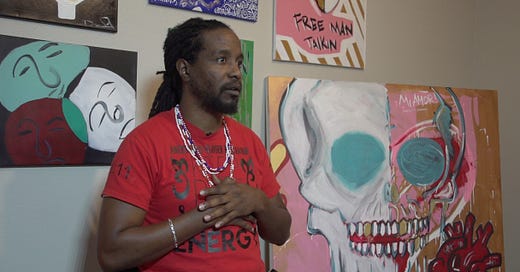P.E.N.S. (Poetic Energy Needed in Society)
This interesting documentary about the spoken word poetry scene in Houston has energy, but suffers from repetition and talking-head format.
Even for someone like me who's not a huge fan of poetry, the traditional sort or the more modern spoken-word version, it's hard to deny the energy of "P.E.N.S. (Poetic Energy Needed in Society)." This documentary looks at the poetry scene in Houston, Texas, which -- no offense to Houstonites -- is not exactly the sort of place you think of as a lively arts scene.
Houston is much like my city of Indianapolis -- everyone knows it, though it doesn't really have a strong identity as a place or culture.
"P.E.N.S." is essentially an act of self-promotion, with the people hosting the live poetry readings also behind this documentary. We talk to Carlos Wallace, co-creator of the series, as well as best-selling author. He talks about how the scene started from a place grounded in stand-up comedy, and segued into spoken-word poetry. Someone notes that poetry and comedy are the only modern art forms where all the performer needs is a microphone.
This is a movie rooted in the Black community, with everyone on stage and virtually everyone in the audience a person of color. The subjects of the slams, or spits, or other words used for live performance, range from personal reflections on love, loss, addiction and personal growth.
There's also plenty of anger, too, and a large percentage of the poetry focuses on African-Americans' fraught relationship to law enforcement. Some of the poems are straight up anti-police hate screeds. It can be tough for a suburban white dude like me to hear this kind of stuff, but I never doubted that it came from a place of authentic, justified rage.
The film's biggest weaknesses is its repetitive nature. Director Mikell Limbrick, another co-founder of P.E.N.S., appears to have shot most of the performance poetry at a single venue using a simple two-camera setup from the audience perspective. At 134 minutes long, the movie is bloated and seems to be just a forum to introduce various poets in a typical interview, then segue to some of their performance, then wrap up with more interview.
Occasionally they'll break out of this rigid format, such as a young man rapping his rhymes on the street, and the movie regains some breath. I was particularly moved by a woman named Rasta, heavily tattooed and sitting on her bed, spitting about wanting to swallow the pills in her hand to end her physical and mental pain. "I just want to be healed!" she ends with a mixture of sadness and self-love.
On the other end of the spectrum is Sunny Celight, a woman with bright orange hair who focuses on love and positivity. Dante Higgins has a smiling face, but raps some of the most invective-filled poems about police brutality.
(I should note most off these are stage names.)
A woman named Kanei, who looks like a librarian, has some insight about how nowadays artist don't just have to produce great art but promote it with large followings on Instagram or YouTube before they can monetize their work. "Now you’re not just selling your art, you’re selling your entity."
Many of the poets came from rapping, comedy or even DJing backgrounds, such as DJ TNT. Scott Free, a military veteran who was stationed in Iraq, has some of the most moving lines talking about growing up with an abusive father who beat his mother. Other poets spit about struggling with addiction, committing burglaries, bad relationships, the strong desire to have a safe community in which to raise their kids, and so on.
The audience really gets into these poetry performances, often standing, swaying and calling back lines of the speaker, much like the Black church experience. It's hard not to get swept up in the rhythm.
I liked a lot of things about "P.E.N.S.," but just wish the filmmakers could've taken a more focused, less structured approach to presenting these compelling artists.





